|
|
|
Sort Order |
|
|
|
Items / Page
|
|
|
|
|
|
|
| Srl | Item |
| 1 |
ID:
116058
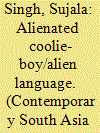

|
|
|
|
|
| Publication |
2012.
|
| Summary/Abstract |
The primary focus of this essay is on the representation of child labour in Mulk Raj Anand's Coolie (1936). I argue that the young-ness of Munoo, the coolie-boy is significant for understanding Anand's social critique of the colonial-capitalist machinery and its reliance upon the sub-waged labour of children and adolescents. It is limiting to read the novel as merely a social critique, however, as it also opens up crucial debates on what it means for an Indian writer writing in English to represent a young ostracised citizen-subject who can hear English and mimic its sounds without having access to an English education. Anand's use of an adolescent is thus significant as an early attempt at foregrounding regional disenfranchisement in English. Through the tropes of listening, seeing, and smelling, and Anand's selective translations and transliterations, I show why Munoo's adolescence matters: it provides a social commentary as well as enabling Anand to highlight the conundrum of representing Munoo's semi-literate, non-English subjectivity into the English language.
|
|
|
|
|
|
|
|
|
|
|
|
|
|
|
|
| 2 |
ID:
098070
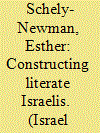

|
|
|
| 3 |
ID:
119580
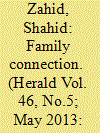

|
|
|
| 4 |
ID:
180034
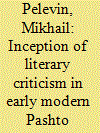

|
|
|
|
|
| Summary/Abstract |
The article overviews the earliest Pashto texts, mostly poetic, in which the incipient forms of literary criticism can be traced as authorial self-reflections related in Persian classics to the self-praise genre (fakhriyya) and explanations of reasons for composing works (sabab-i taʾlīf). Under close examination are the seventeenth century verses of the poets affiliated with the Roshānī religious community and the writings of Khushḥāl Khān Khaṫak (d. 1689). Analyzed texts prove that through the rudimentary discourse on a variety of literary criticism topics, Pashtun authors of early modern times declared and justified the presence of emerging literature in Pashto within the Persophone cultural space of Mughal India, articulating simultaneously their commitment to the proliferation of literacy and Islamic book culture among their countrymen.
|
|
|
|
|
|
|
|
|
|
|
|
|
|
|
|
| 5 |
ID:
101180
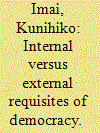

|
|
|
| 6 |
ID:
113068


|
|
|
|
|
| Publication |
2012.
|
| Summary/Abstract |
Though Peelu vance, a village in central Punjab, boasts 96% literacy, it is still a shabby and dusty back-water and its deplorable poverty is reflective of the quality of education available to its residents.
|
|
|
|
|
|
|
|
|
|
|
|
|
|
|
|
| 7 |
ID:
137903


|
|
|
|
|
| Summary/Abstract |
Both Nepal and Bhutan formed new parliamentary governments in 2014. In both cases, a new party took control, but major policies remained unchanged. Many people experienced hardships in buying basic commodities (because of inflation in Nepal and a subsidy dispute in Bhutan). Nepal faced three natural disasters.
|
|
|
|
|
|
|
|
|
|
|
|
|
|
|
|
| 8 |
ID:
119748
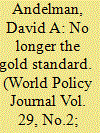

|
|
|
|
|
| Publication |
2012.
|
| Summary/Abstract |
Will McAvoy, a primetime cable news anchor and Aaron Sorkin's lead character in his new HBO primetime series "The Newsroom," pushed to the limits in the series pilot, blurts out in a public forum that the United States is no longer the world leader in any important metric. "We are seventh in literacy, 22nd in science, 49th in life expectancy, 178th in infant mortality, third in median household income, number four in labor force, and number four in exports," McAvoy shouts. "So when you ask what makes us the greatest country in the world, I don't know what the fuck you're talking about." Needless to say, Sorkin's loud-mouthed anchor runs into a mess of trouble as a result of his outburst.
|
|
|
|
|
|
|
|
|
|
|
|
|
|
|
|
| 9 |
ID:
110818
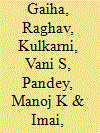

|
|
|
|
|
| Publication |
2012.
|
| Summary/Abstract |
Despite accelerated growth there is pervasive hunger, child undernutrition and mortality in India. Our analysis focuses on their determinants. Raising living standards alone will not reduce hunger and undernutrition. Reduction of rural/urban disparities, income inequality, consumer price stabilization, and mothers' literacy all have roles of varying importance in different nutrition indicators. Somewhat surprisingly, public distribution system (PDS) do not have a significant effect on any of them. Generally, child undernutrition and mortality rise with poverty. Our analysis confirms that media exposure triggers public action, and helps avert child undernutrition and mortality. Drastic reduction of economic inequality is in fact key to averting child mortality, conditional upon a drastic reordering of social and economic arrangements.
|
|
|
|
|
|
|
|
|
|
|
|
|
|
|
|
| 10 |
ID:
097048


|
|
|
| 11 |
ID:
118888


|
|
|
| 12 |
ID:
138250
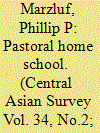

|
|
|
|
|
| Summary/Abstract |
Literacy before and after the 1921 People’s Revolution in Mongolia has been largely represented by socialist historiography and post-socialist urban perspectives, which have rendered unofficial and non-pragmatic literacies invisible. This study explores rural, vernacular and grassroots literacy theories to recontextualize the pre-revolutionary category of Mongolian home schooling and to offer a new perspective – pastoral literacy – which enables historians and other researchers of Central Asia to represent the literacy practices of non-urban semi-nomads more accurately and vividly. This study applies the pastoral literacy perspective to literacy narratives extracted from University of Cambridge Oral History of Twentieth Century Mongolia interviews and demonstrates that pastoral home schooling was a socially and culturally salient domain for acculturating young Mongolians into the 1960s. Mongolian pastoral home schooling consisted largely of personal, male teacher–student relationships, authoritative teaching models, alphabet-based curricula, as well as texts and materials adapted from dominant religious and state literacies.
|
|
|
|
|
|
|
|
|
|
|
|
|
|
|
|
| 13 |
ID:
096275
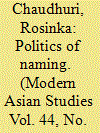

|
|
|
|
|
| Publication |
2010.
|
| Summary/Abstract |
Henry Derozio, India's first modern poet, used the pseudonym 'An East Indian' for several poems he published in his lifetime, and he may have used it again in a heated controversy that played itself out in the correspondence columns of the India Gazette, Calcutta's leading newspaper, from May 26 to June 5, 1825. The occasion was an editorial comment upon a community of office-goers in the city-called, at the time, 'sircars'-who had set up a literary association. This editorial was widely perceived to be reactionary, and civil society responded vigorously in protest at the injustice. The sequence of editorials and letters published on this issue, which seem to have been written by Englishmen, East Indians and Indians alike, demonstrate a remarkable liberalism of spirit and a free-thinking attitude to ethnicity that was soon to disappear in the stiffening boundaries of a racially divided society. 1825 was also the year that Derozio began to publish prolifically in the poetry columns of newspapers and periodicals in the city; by the time he died, in 1831, he had published two books of poems in 1827 and 1828 and had created a revolution of sorts among the radicalised youth of the Hindu College, from which he had been dismissed for his role in their alienation from tradition. In 1831, a few months before his death, Derozio addressed a mammoth meeting called to commemorate the return of John Ricketts, the East Indian representative, from his mission to the English houses of Parliament for a redressal of the community's grievances. Using these two lost occasions-the public correspondence and the meeting-both concerned with the politics of naming, this paper will attempt to present the early radical interventions of the mixed-race community in initiating a discourse of civic rights and human dignity which led, ultimately, to organised attempts at constitutional change and political reform in India, whose estimation is underrated in present-day contexts.
|
|
|
|
|
|
|
|
|
|
|
|
|
|
|
|
| 14 |
ID:
119581


|
|
|
| 15 |
ID:
092471


|
|
|
| 16 |
ID:
123082
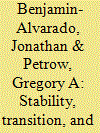

|
|
|
|
|
| Publication |
2012.
|
| Summary/Abstract |
JONATHAN BENJAMIN-ALVARADO and GREGORY A. PETROW examine Gallup World Poll data from Cuba to evaluate both the level of Cuban regime approval, as well as its causes. They conclude that Cubans are satisfied overall with their leaders, and that part of this satisfaction stems from equating the regime with the state. - See more at: http://www.psqonline.org/article.cfm?IDArticle=18879#sthash.5a3KNSnI.dpuf
|
|
|
|
|
|
|
|
|
|
|
|
|
|
|
|
| 17 |
ID:
058136
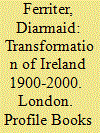

|
|
|
|
|
| Publication |
London, Profile Books Ltd, 2004.
|
| Description |
xi, 884p.Hbk
|
| Standard Number |
1861973071
|
|
|
|
|
|
|
|
|
|
|
|
Copies: C:1/I:0,R:0,Q:0
Circulation
| Accession# | Call# | Current Location | Status | Policy | Location |
| 049015 | 941.7082/FER 049015 | Main | On Shelf | General | |
|
|
|
|
|
|
|
|
|